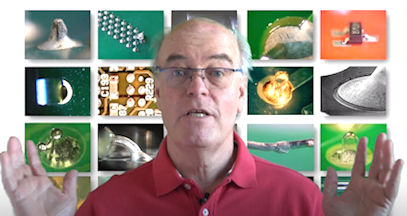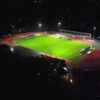
It’s great to be back at IPC APEX 2021 albeit online to meet and discuss process and production issues with engineers from around the globe. It’s been a while, but having presented many education classes and special features at IPC APEX in San Diego, Las Vegas plus Anaheim it’s good to have the opportunity to participate online this year
Lead-Free Wave Soldering & Process Troubleshooting – Failures Causes & Cures – Part 1
Tuesday, 9th March 2021 – 9:00 AM to 12:00 PM (Check Europe Times)
Lead-Free Wave Soldering & Process Troubleshooting – Failures Causes & Cures – Part II
Tuesday 9th March 2021 – 2:00 PM to 5:00 PM (Check Europe Times)
Low Temperature Soldering, Assembly, Inspection & Defects – Causes & Cures – Part I
Thursday 11th March 2021 – 9:00 AM to 12:00 PM (Check Europe Times)
Low Temperature Soldering, Assembly, Inspection & Defects – Causes & Cures – Part II
Thursday 11th March 2021 – 2:00 PM to 5:00 PM (Check Europe Times)
Low Temperature Soldering, Assembly, Inspection & Defects – Causes & Cures
The use of Low Temperature Soldering LTS is gaining interest in the industry to reduce cost, prevent component and PCB damage and improve reliability. It’s different but that does not mean it cannot be introduced into your process with existing process equipment. Generally speaking, solders used regally in assembly reflow at over 220oC, low temperature solders reflow at under 180oC. There are some organization predicting a large growth in low temperature materials in the next two to three years for multistep soldering
Many companies have been using tin/bismuth alloys for some years reducing cost on PCBs and energy. Other companies have been using tin/indium for rework of lead-free area array packages with success. There are savings to be made even if the cost of some solder alloy is more expensive provided you consider the total cost of manufacture. We produced the first book, video and interactive CD-ROM on pin in hole intrusive reflow, so we believe we are in a good position to help engineers achieve high yields with low temperature materials with PIHR
As special bonus for delegates booking on my APEX course, we are providing a FREE set of LTS Soldering and De-Soldering Wall charts for onsite training
What You Will Learn:
Why use low temperature solder
Benefit over lead-free alloys
Materials available
Printing paste
Use of support materials
Reflow soldering and rework results
Reliability with mixed alloys
Inspection results
Defect types and joint failures
Who Will Benefit:
The workshop illustrates the practical use of LT materials in reflow, selective and rework so the content should benefit Process and Quality Engineers. As inspection and defects are covered it will also be ideal for Product Operators, Supervisors and Line Managers tasked with its implementation
Lead-Free Wave Soldering & Process Troubleshooting – Failures Causes & Cures
Do we have all the answers to successful lead-free wave soldering? No, and to quote a well-known soldering metallurgist, “We don’t even know all the questions” People do not use wave soldering any more, or do they?
Successful Lead-free is still new to many and the wave soldering process is the most affected by the change of materials with cost increase in alloy, solder bath and copper erosion plus increased temperatures all makes process change demanding. During this workshop we will look at the practical experience to date and try to provide answers to as many questions that have come to light during early introduction and its continued use.
Each delegate attending my IPC APEX course will receive an interactive Guide to Wave Soldering & Defect Guide valued at $175 covering all aspects of wave soldering and defects. Created by the author to help new and experienced staff with typical process questions. This session aims to provide a practical guide to lead-free wave soldering for Production Engineers, Supervisions and Production Operators looking at setting up, operating, or selecting materials and equipment. It will also give an insight to Equipment Suppliers and Material Manufactures on what may need to be addressed for today’s circuit designs.
What You Will Learn:
Soldering theory, wetting, reliability, PCB design
Copper erosion problems
Effect of tin-lead on joint reliability
Soldering materials
Spray fluxing
Equipment settings, pre heat, fluxer, wave settings
PCB board support
Lead-free soldering parameters
Inert soldering
Solder bath erosion
Effect of bath contaminates
Quality control checks
Soldering defects, causes and cures
Fillet lifting
Secondary reflow
LF solder shorts
Who Will Benefit:
The workshop illustrates the practical use of wave soldering so the content should benefit Process and Quality Engineers. As inspection and defects are covered it will also be ideal for Product Operators, Supervisors and Line Managers tasked with implementation of Lead Free wave soldering or improving yields



